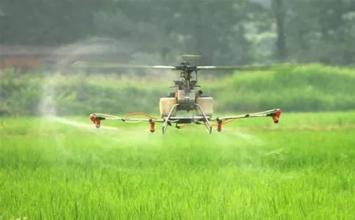The advantages of UAV spraying herbicide instead of UAV, UAV can only operate after passing the training certificate.
Due to the outflow of rural population and aging and other problems, how to use machinery and equipment to reduce the use of manpower has become an important issue, and the use of drones to spray pesticides has become one of the choices. The Council of Agriculture recently announced the draft amendment to some provisions of the "measures for Pesticide use and Pesticide residue testing of Agricultural products". It is pointed out that pesticide spraying by drones should be carried out by those who have obtained qualified certificates on behalf of the agricultural pharmaceutical industry.
Measures of the Bureau of Prevention and Inspection for predicting the use of pesticides and sampling testing of Pesticide residues in Agricultural products
Last year, the Civil Aviation Law was amended to take control of remote-controlled drones, stipulating that "no objects may be thrown or sprayed by remote-controlled drones," which urgently needs to be released by the Council of Agriculture. Therefore, the Council of Agriculture recently announced some draft amendments to the "measures for Pesticide use and sampling of Pesticide residues in Agricultural products", stipulating that "the operation of pesticide application on unmanned aerial vehicles shall be carried out by those who spray pesticides on their behalf. Its operators and unmanned flying vehicles shall comply with the provisions of the Civil Aviation Law and relevant laws and regulations, and operators must obtain a certificate of qualified training for pesticide spraying technicians in the category of aerial application before they can operate."
The spray of the unmanned vehicle shall not exceed 4 meters of the crown.
Zou Huijuan, deputy director of the Prevention and Inspection Bureau of the Council of Agriculture, said that the original aerial pesticide application was for aircraft to spray pesticides on a large scale, so it was stipulated in the method that residents should be notified three days in advance, but after switching to drones, the working space was small, so it would not affect the normal work and rest of residents, so it was pointed out in the measures that "spraying with unmanned vehicles" did not need to be notified three days in advance.
Zou Huijuan said: the measures stipulate that the spraying operation of unmanned aerial vehicles should be carried out by spraying agents, and the Civil Aviation Law also stipulates that only legal persons can register, so at present, those who can use drones to apply medicine are those who have legal persons registered. The method stipulates that the crown should not exceed 4 meters, she explained, because if the distance is too high, there may be a risk of drifting, and the operators should also fill in the application records and upload the flight trajectory to the system after application.
Zou Huijuan also said that at present, the establishment of relevant courses planned by the Prevention and Inspection Bureau and the Institute of drugs and drugs will also have a better grasp of the current situation of drone spray operators.

- Prev
A new variety of kidney fern: what are the characteristics of kidney fern Taitung 1 and kidney fern Taitung 1 bred in Taitung field?
In recent years, many people will plant plants indoors to relieve pressure, but sometimes they may wither and wither if they are not taken care of. Taitung Agricultural improvement Farm announced on the 23rd that Taitung No. 1, with antler-like bifurcations at the top of the plant, fine leaves and good weather resistance can be produced all year round. Fit room
- Next

How to plant Sedum sedum? The planting techniques of Sedum sedum what are the popular varieties of Sedum
Compared with Sedum plants, few plants are more tolerant than sunlight and bad soil. In fact, the growing Sedum is easy, easy, and even the newest gardener can be good at it. There are a large number of varieties of Sedum to choose from, and you will find one suitable for you.
Related
- A course of planting techniques and methods on how to grow carrots
- How to plant the latest tulips?
- Is it better to pick tea in the morning or in the afternoon? When is the best time for tea to be picked? what is the third or fifth tea?
- Launch Yuanxiao Happy combination Haocha + Tea Yuan healthy Taste
- Penghu Tourism "Fireworks 20 Parade with You"
- 2022 West Lake Happiness holds "Digital Revitalization Voucher" and draws iphone13 and laptop.
- Banqiao Fuzhou social houses are designed to change start-up combined with police elimination to create a safe and livable environment
- The convenient measure of "mechanical weeding" in Xinbei has been abused and the Agriculture Bureau has imposed heavy penalties on the illegal land consolidation.
- Changgeng University Joins Hands with Four Memory Factories to Rescue Memory Talent Shortage
- The list of Taiwan's top 100 MVP managers is listed by the Director-General of the Farmers' Association of Sanxia District.

